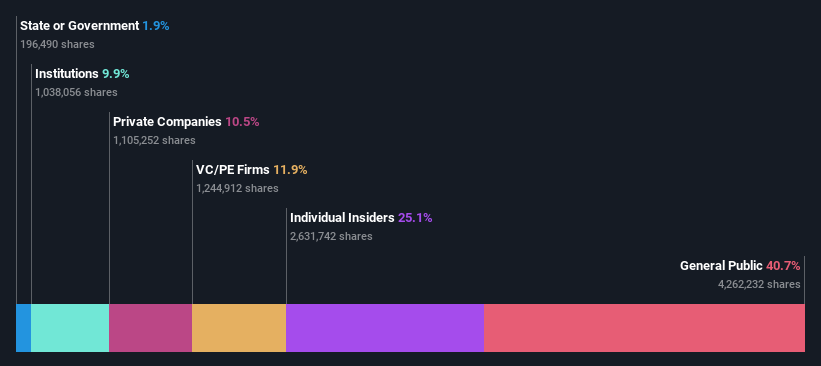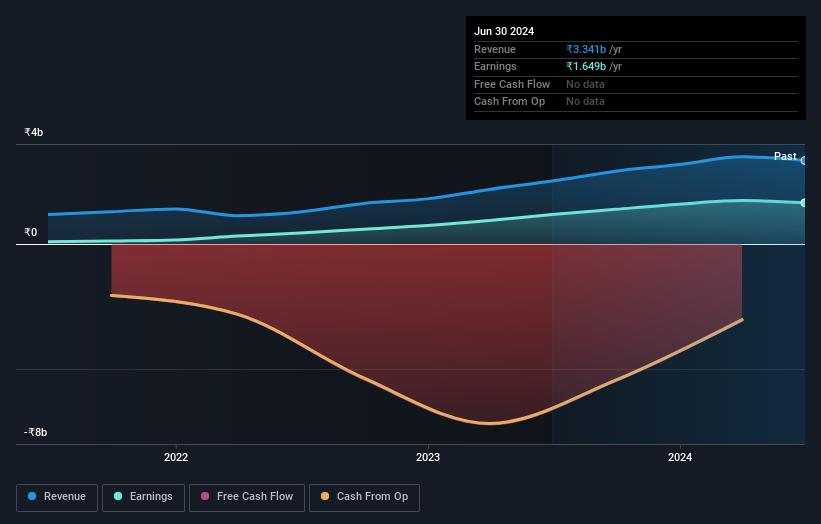- India
- /
- Consumer Finance
- /
- NSEI:ARMANFIN
Arman Financial Services Limited's (NSE:ARMANFIN) market cap up ₹1.8b last week, benefiting both retail investors who own 41% as well as insiders

Key Insights
- Arman Financial Services' significant retail investors ownership suggests that the key decisions are influenced by shareholders from the larger public
- The top 13 shareholders own 50% of the company
- 25% of Arman Financial Services is held by insiders
If you want to know who really controls Arman Financial Services Limited (NSE:ARMANFIN), then you'll have to look at the makeup of its share registry. With 41% stake, retail investors possess the maximum shares in the company. Put another way, the group faces the maximum upside potential (or downside risk).
Retail investors gained the most after market cap touched ₹19b last week, while insiders who own 25% also benefitted.
Let's delve deeper into each type of owner of Arman Financial Services, beginning with the chart below.
Check out our latest analysis for Arman Financial Services

What Does The Institutional Ownership Tell Us About Arman Financial Services?
Institutional investors commonly compare their own returns to the returns of a commonly followed index. So they generally do consider buying larger companies that are included in the relevant benchmark index.
Arman Financial Services already has institutions on the share registry. Indeed, they own a respectable stake in the company. This suggests some credibility amongst professional investors. But we can't rely on that fact alone since institutions make bad investments sometimes, just like everyone does. When multiple institutions own a stock, there's always a risk that they are in a 'crowded trade'. When such a trade goes wrong, multiple parties may compete to sell stock fast. This risk is higher in a company without a history of growth. You can see Arman Financial Services' historic earnings and revenue below, but keep in mind there's always more to the story.

Arman Financial Services is not owned by hedge funds. The company's largest shareholder is SAIF Advisors Limited, with ownership of 12%. With 9.0% and 6.3% of the shares outstanding respectively, Namra Holdings And Consultancy Services LLP and Jayendrabhai Patel are the second and third largest shareholders. Jayendrabhai Patel, who is the third-largest shareholder, also happens to hold the title of Vice Chairman.
Looking at the shareholder registry, we can see that 50% of the ownership is controlled by the top 13 shareholders, meaning that no single shareholder has a majority interest in the ownership.
While studying institutional ownership for a company can add value to your research, it is also a good practice to research analyst recommendations to get a deeper understand of a stock's expected performance. Our information suggests that there isn't any analyst coverage of the stock, so it is probably little known.
Insider Ownership Of Arman Financial Services
While the precise definition of an insider can be subjective, almost everyone considers board members to be insiders. Company management run the business, but the CEO will answer to the board, even if he or she is a member of it.
Most consider insider ownership a positive because it can indicate the board is well aligned with other shareholders. However, on some occasions too much power is concentrated within this group.
Our information suggests that insiders maintain a significant holding in Arman Financial Services Limited. Insiders own ₹4.7b worth of shares in the ₹19b company. This may suggest that the founders still own a lot of shares. You can click here to see if they have been buying or selling.
General Public Ownership
With a 41% ownership, the general public, mostly comprising of individual investors, have some degree of sway over Arman Financial Services. While this size of ownership may not be enough to sway a policy decision in their favour, they can still make a collective impact on company policies.
Private Equity Ownership
With a stake of 12%, private equity firms could influence the Arman Financial Services board. Some investors might be encouraged by this, since private equity are sometimes able to encourage strategies that help the market see the value in the company. Alternatively, those holders might be exiting the investment after taking it public.
Private Company Ownership
Our data indicates that Private Companies hold 11%, of the company's shares. Private companies may be related parties. Sometimes insiders have an interest in a public company through a holding in a private company, rather than in their own capacity as an individual. While it's hard to draw any broad stroke conclusions, it is worth noting as an area for further research.
Next Steps:
I find it very interesting to look at who exactly owns a company. But to truly gain insight, we need to consider other information, too. Case in point: We've spotted 2 warning signs for Arman Financial Services you should be aware of, and 1 of them can't be ignored.
Of course, you might find a fantastic investment by looking elsewhere. So take a peek at this free list of interesting companies.
NB: Figures in this article are calculated using data from the last twelve months, which refer to the 12-month period ending on the last date of the month the financial statement is dated. This may not be consistent with full year annual report figures.
New: Manage All Your Stock Portfolios in One Place
We've created the ultimate portfolio companion for stock investors, and it's free.
• Connect an unlimited number of Portfolios and see your total in one currency
• Be alerted to new Warning Signs or Risks via email or mobile
• Track the Fair Value of your stocks
Have feedback on this article? Concerned about the content? Get in touch with us directly. Alternatively, email editorial-team (at) simplywallst.com.
This article by Simply Wall St is general in nature. We provide commentary based on historical data and analyst forecasts only using an unbiased methodology and our articles are not intended to be financial advice. It does not constitute a recommendation to buy or sell any stock, and does not take account of your objectives, or your financial situation. We aim to bring you long-term focused analysis driven by fundamental data. Note that our analysis may not factor in the latest price-sensitive company announcements or qualitative material. Simply Wall St has no position in any stocks mentioned.
About NSEI:ARMANFIN
Arman Financial Services
Together with its subsidiary, Namra Finance Limited, operates as a non-banking finance company in India.
Mediocre balance sheet and slightly overvalued.
Market Insights
Community Narratives




